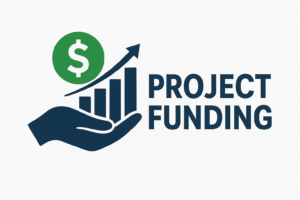Project Funding, Project Financing, and Business Loans: A Complete Guide.

In today’s competitive business world, securing project funding, project financing, and business loans is crucial for startups, corporations, and even governments to bring their visions to life. Whether it’s a new infrastructure project, a technology startup, or business expansion, access to the right type of financing determines success.
This guide explains what project funding, project financing, and business loans are, their uses, types, and real-world examples to help you understand how they drive growth and development.
What is Project Funding?
Project funding refers to the provision of capital for a specific project. Unlike general business financing, project funding is tied to a particular purpose such as building a factory, developing real estate, or launching a renewable energy plant.
 Key Features of Project Funding:
Key Features of Project Funding:
- Funds are dedicated to one project only.
- Repayment often depends on the success of the project.
- Investors may include banks, private equity firms, venture capitalists, or international financial institutions.
Uses of Project Funding:
- Infrastructure development (roads, bridges, airports).
- Energy projects (solar farms, wind energy, oil and gas).
- Large-scale real estate developments.
- Research and innovation projects.
What is Project Financing?
Project financing is a structured method of funding where the project itself becomes the collateral. Lenders evaluate the future cash flows generated by the project to determine repayment.
 Key Features of Project Financing:
Key Features of Project Financing:
- It is usually long-term in nature.
- Involves multiple stakeholders: sponsors, lenders, investors, and contractors.
- Risk is shared between the parties involved.
- Common in large-scale projects such as mining, transportation, and telecommunications.
Types of Project Financing:
- Non-Recourse Financing – Lenders have no claim on the borrower’s other assets; repayment depends entirely on the project.
- Limited Recourse Financing – Lenders can claim limited support from the project sponsors.
- Full Recourse Financing – Borrowers are fully responsible for repayment, even if the project fails.
What are Business Loans?
A business loan is a borrowed amount of money that companies use for operations, expansion, or investment. Unlike project financing, business loans are not tied to one specific project and can be used flexibly.
 Key Features of Business Loans:
Key Features of Business Loans:
- Offered by banks, credit unions, or online lenders.
- Require repayment with interest over an agreed period.
- May need collateral, depending on the type of loan.
Types of Business Loans:
- Term Loans – Lump-sum loans repaid over fixed terms.
- Working Capital Loans – For day-to-day business expenses.
- Equipment Financing – Used to purchase machinery or tools.
- Lines of Credit – Flexible borrowing similar to a credit card.
- Invoice Financing – Loans secured against unpaid invoices.
Case Studies & Real-World Examples
- Project Funding Example – Renewable Energy Plant
A solar energy company secured $200 million in project funding from international investors to build a solar farm. The funding covered construction, equipment purchase, and workforce hiring. - Project Financing Example – Toll Road Infrastructure
A government partnered with private investors under a Public-Private Partnership (PPP) to construct a toll road. The repayment came from toll fees collected over 25 years, making it a perfect case of project financing. - Business Loan Example – Small Business Expansion
A retail clothing store obtained a $100,000 business loan from a commercial bank to open two new branches. The loan was repaid through increased sales revenue.
Benefits of Project Funding, Project Financing, and Business Loans
- Access to Capital – Helps businesses and governments start projects without upfront capital.
- Risk Sharing – Especially in project financing, risk is distributed among multiple stakeholders.
- Growth & Expansion – Business loans enable small and medium enterprises (SMEs) to expand operations.
- Economic Development – Infrastructure and energy projects funded through these methods stimulate job creation and development.
Conclusion
Whether you are a startup, SME, or multinational corporation, understanding project funding, project financing, and business loans is essential for growth. While project funding provides dedicated capital for specific initiatives, project financing leverages future cash flows and risk-sharing models, and business loans offer flexible financing options for everyday operations and expansion.
Choosing the right financing structure depends on the size, scope, and risk profile of your project or business. By leveraging these financial tools, companies can achieve sustainable growth and investors can gain long-term returns.

For more information, please contact us:
BECTIC FINANCE COMPANY LIMITED
Website : becticfinance.com
Email : info@becticfinance.com
Phone number : +85281924518
We deliver with time and precision as set forth in the agreement. Our terms and Conditions are reasonable and we work directly with issuing bank lease providers, this instrument can be monetized on your behalf for 100% funding. Intermediaries/Consultants/Brokers are welcome to bring their clients and are 100% protected. In complete confidence, we will work together for the benefits of all parties involved.
#Bankinstrumentproviders, #Bankguarantee(B/G)providers, #StandbyLetterofCreditprovider, #Moneylenders, #Projectfunding, #Projectfinancing, #Sblcproviders, #Leasebgsblc, #Leasesblc, #Leasebankinstruments, #Businessloans, #Businessloanlender, #Smeloans, #Nonrecourseloans, #becticfinancecompanylimited, BankInstrumentsProviders, BankGuarantee(BG)Providers, StandbyLetterofCredit(SBLC)Provider’s, BankInstrument(BG/SBLC)Monetizers.

Recent Comments